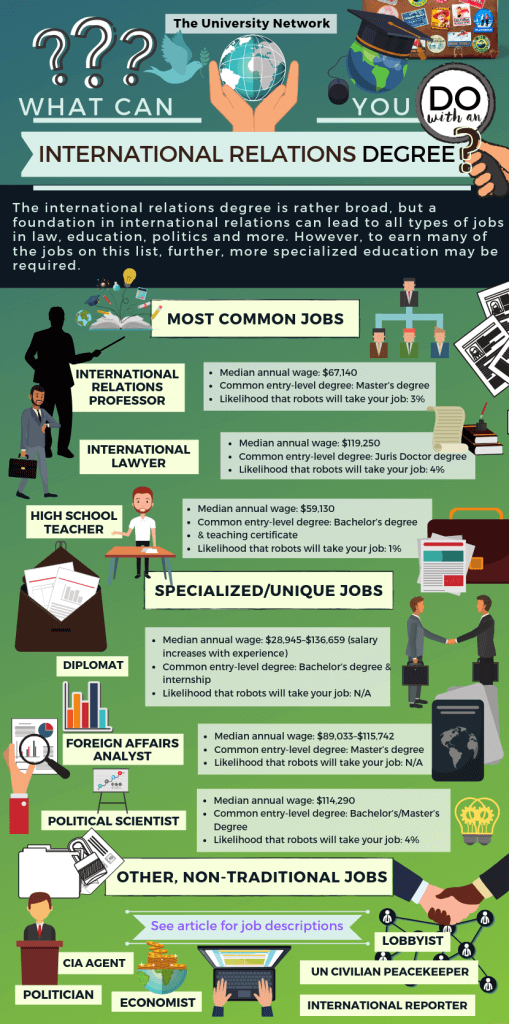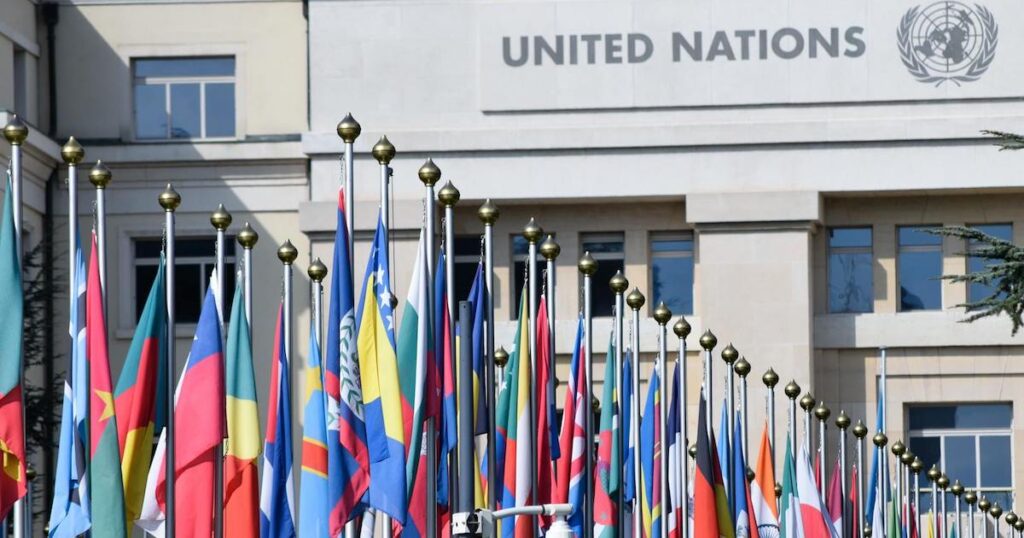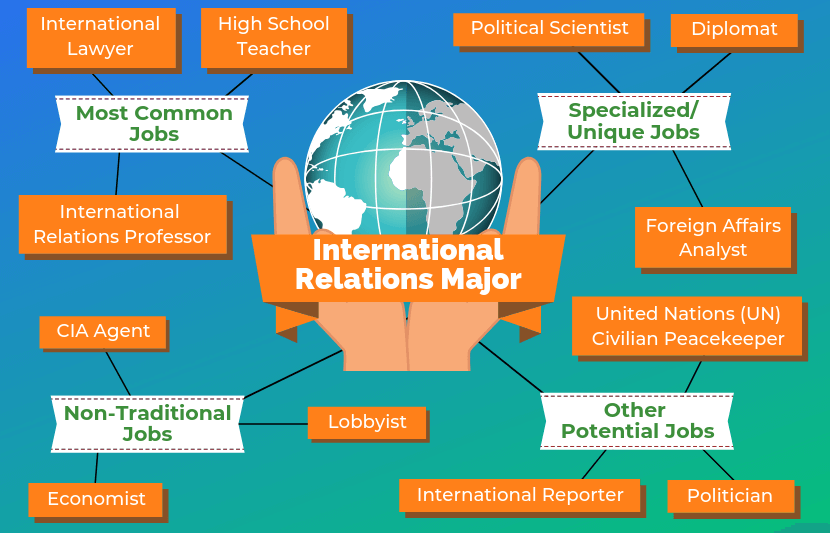International Relations Jobs
The international relations major is a perfect fit for those who are interested in the humanities, politics and/or international affairs. The degree is rather broad, but a foundation in international relations can lead to all types of jobs in law, education, politics and more. However, to earn many of the jobs on this list, further, more specialized education may be required.
Here is a list of 12 possible jobs for international relations majors:
Most Common Jobs for International Relations Majors
1. International Relations Professor

Like many who pursue humanities-based degrees, international relations majors are comfortable in the university setting, where they can learn, research and converse. But to be a good college professor, patience, enthusiasm, communication skills and organizational skills are vital. To earn a job teaching about international affairs at the post-secondary level, a master’s degree (and sometimes a doctorate degree), is required. In addition to teaching, some college professors also conduct research and write scholarly articles.
Median annual wage: $67,140
Common entry-level degree: Master’s degree
Likelihood that robots will take your job: 3%
2. International Lawyer

Because international relations has such close ties to law and political science, many who major in the subject aspire to become international lawyers who focus on international crimes, disputes, and other international affairs. But, to do so, completing a bachelor’s degree program is just the first step. If you want to become an international lawyer, you will also have to pass the Law School Admissions Test (LSAT), apply to law school, earn a Juris Doctor degree and pass the Bar examination — all before you can begin to practice law. Generally, it takes 3 years to graduate from law school, so the entire process takes 7-8 years. If you’re interested in earning your master’s degree in international relations while working towards your Juris Doctor degree, some universities, including Boston University, offer joint programs.
Median annual wage: $119,250
Common entry-level degree: Juris Doctor degree
Likelihood that robots will take your job: 4%
3. High School Teacher

International relations is not a common high school course, but those who major in the subject often develop the knowledge needed to teach history and government at the high school level. But, before you can start teaching, you have to complete an internship in a school classroom, pass the state-required test for teachers and receive a teaching certificate/license.
If you are dead set on being a teacher, the best advice would be to major in education. But if you’re still uncertain about what you want to do, a degree in international relations could ultimately help you land a job teaching government and/or history and/or international affairs. As long as your degree is in a related field to the classes you aspire to teach, you will be okay.
Median annual wage: $59,130
Common entry-level degree: Bachelor’s degree & teaching certificate
Likelihood that robots will take your job: 1%

Specialized, Unique Jobs for International Relations Majors
4. Diplomat

Diplomats are hired by governmental bodies to represent their country’s stance on international gatherings discussing international affairs. Broadly, they conduct meetings with other country’s diplomats to discuss international relations in regards to trade, peace, the environment and other issues. But, becoming a diplomat is no simple task. After receiving a degree in international relations, aspiring diplomats have to fulfill an overseas internship with the U.S. Department of State. Many of them also go on to earn their master’s and doctorate degrees.
Median annual wage: $28,945–$136,659 (salary increases with experience)
Common entry-level degree: Bachelor’s degree & internship
Likelihood that robots will take your job: N/A
5. Foreign Affairs Analyst

Foreign affairs analysts liaise between the company or government they work for and a district or country they are assigned to observe. Generally, they are experts in one specific subject, such as trade or economics, and they use their expertise and knowledge of a specific region to advise and assist the organization they work for in developing policy, setting goals and more. This career can be very rewarding, but the jobs regarding international affairs aren’t easy to get. Typically, a master’s degree and vast knowledge of the culture and politics of a specific region are required to earn a position. It is also a plus if you are fluent in more than one language.
Median annual wage: $89,033–$115,742
Common entry-level degree: Master’s degree
Likelihood that robots will take your job: N/A
6. Political Scientist

Political scientists’ day-to-day responsibilities vary depending on where they work. But more broadly, they analyze the origins and changes in political systems. They also can be tasked with developing political ideas and strategies, which can be passed on to politicians. Political scientists can work for the government, non-profits, think tanks and more. Some institutions will hire staffers right after they finish their political science bachelor’s degree, but a master’s degree, along with work experience through an internship or campaign, will open up better job opportunities.
Median annual wage: $114,290
Common entry-level degree: Bachelor’s/Master’s Degree
Likelihood that robots will take your job: 4%
Non-Traditional Jobs for International Relations Majors
7. CIA Agent

For international relations majors who are also interested in the criminal justice system, a career as a CIA agent is ideal. CIA agents have the responsibility of helping the federal government investigate international crimes. There are many advantages to being a CIA agent, including high pay and prestige, but CIA agents don’t always get to choose where they live. They have to report to specific bases, which can be overseas. But becoming a CIA agent is no simple task. In addition to earning a bachelor’s degree, aspiring CIA agents need to complete specific training and should have at least 3 years of criminal investigation experience.
Median annual wage: $74,872–$136,771
Common entry-level degree: Bachelor’s degree
Likelihood that robots will take your job: N/A
8. Economist

Economists are employed by a variety of institutions, including governments, universities, think tanks, corporations and private research firms, to evaluate economic issues. They spend their days conducting qualitative and quantitative research for organizations in an attempt to solve economic issues or better understand the function of the economy. Depending on their employer, an economist’s duties and role might vary. For example, an economist working for a government might formulate policy proposals, while an economist working for a private corporation might help the company understand how the economy might affect its business or develop strategies that will help it perform better. While a degree in international relations can serve as a stepping stone into a career as an economist for a governmental body, more advanced economics-based education will likely be needed to earn a job.
Median annual wage: $102,490
Common entry-level degree: Bachelor’s degree
Likelihood that robots will take your job: 43%
9. Lobbyist

At large, lobbyists try to persuade lawmakers to propose and approve of legislation. While there is no specific educational requirement to become a lobbyist, an international relations degree, for example, would prepare an individual with the essential background knowledge he or she needs to effectively lobby for legislature regarding international affairs. In addition to being knowledgeable, aspiring lobbyists should be social individuals with good communication skills.
Median annual wage: $89,691–$153,318
Common entry-level degree: Bachelor’s degree
Likelihood that robots will take your job: N/A
Other Potential Jobs for International Relations Majors
10. United Nations (UN) Civilian Peacekeeper

Civilian peacekeepers travel across the world to help provide safety and security to people living in damaged or war-stricken countries. Broadly, they could be assigned to help in the areas of finance, logistics and communication, among other areas. Some civilian peacekeepers serve as volunteers, but there are also paid staff positions, such as the ones under the United Nations. Generally, to become a staff member of the United Nations, a master’s or doctorate degree is needed. Additionally, even the United Nations’ entry-level positions typically require multiple years of professional experience. To learn more about how to apply to positions at the United Nations, check out the United Nations’ careers page.
Median annual wage: $37,000–$123,000 (salary increases with experience)
Common entry-level degree: Master’s degree/Ph.D.
Likelihood that robots will take your job: N/A
11. Politician

Technically, anyone could consider themselves as a politician, but to have a legitimate career in politics, there are many preparatory steps. The first is developing an understanding of the Constitution and the governmental system as well as global governance through pursuing a bachelor’s degree in international relations. But after that, aspiring politicians will often have to network, volunteer on other people’s campaigns and develop their own political passions and strategies all before running for even small, local positions before getting involved in international affairs. Running for office takes time, money and commitment. But once you’ve earned a position and have developed a name for yourself, you can gradually start running for more prestigious roles in state and national government.
Median annual wage: Varies widely, depending on local, state or federal position
Common entry-level degree: Bachelor’s/Master’s degree & internship experience
Likelihood that robots will take your job: N/A
12. International Reporter

Technically, there is no required degree to become a reporter, but you will have a hard time finding a job without one. Skilled reporters are master storytellers with strong writing and grammar skills. To learn the essential skills, most aspiring reporters study journalism in college. However, a degree in international relations can equip people with the knowledge they need to write in-depth, accurate articles on international affairs.
Median annual wage: $40,910
Common entry-level degree: Bachelor’s degree
Likelihood that robots will take your job: 11%
10 Famous U.S. Diplomats
- Madeleine Albright
- Warren Christopher
- Hillary Clinton
- Frederick Douglass
- Benjamin Franklin
- Henry Kissinger
- Colin Powell
- Condoleezza Rice
- Eleanor Roosevelt
- Shirley Temple
To explore options for other majors, click here.



